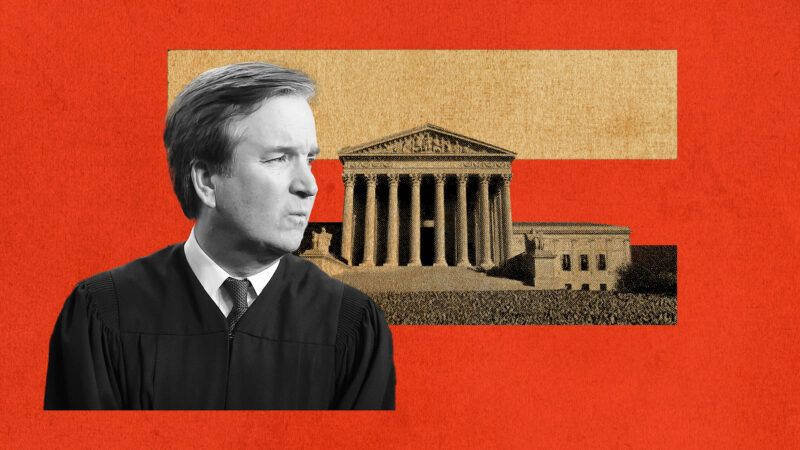Kavanaugh Flouts the Fourth Amendment and Blesses Trump's Racial Profiling
The justice’s stance on immigration enforcement is undermined by the facts of the case before him.

The Trump administration recently asked the U.S. Supreme Court to bless racial profiling by immigration agents, and a majority of the justices have now complied. While this regrettable action is not technically the last legal word on the matter, it is a depressing reminder that the Fourth Amendment right to be free from unreasonable search and seizure regardless of skin color has joined the already too-long list of constitutional rights that the Supreme Court sees fit to disrespect.
You’re reading Injustice System from Damon Root and Reason. Get more of Damon’s commentary on constitutional law and American history.
Let's review how we got here.
Last month, the U.S. Court of Appeals for the 9th Circuit ruled that the Trump administration's immigration crackdown in Los Angeles "likely" violated the Fourth Amendment rights of multiple U.S. citizens, who were unlawfully seized based solely on such factors as their "apparent race or ethnicity," or the fact that they were "speaking Spanish or speaking English with an accent." The 9th Circuit then upheld a lower court order that temporarily blocked the administration from using such likely illegal tactics while the lawsuit against the government played out in court.
But in an unsigned emergency order issued this week in Noem v. Perdomo, a majority of the Supreme Court lifted the block and allowed the administration's behavior to resume. To be clear, the original lawsuit may still proceed in court, but the government's likely illegal tactics will remain in use unless they are overturned by a final ruling on the merits.
Why did the Supreme Court do it? We don't know because the majority didn't say. It was an emergency order issued on what is often called the shadow docket, a place where big legal questions are sometimes rapidly answered without the benefit of either full briefing or oral arguments. In this case, there wasn't even an accompanying written opinion to explain the far-reaching result.
One member of the majority, however, did offer his own explanation in the form of a concurrence. But in doing so, Justice Brett Kavanaugh only revealed just how far his disregard for the Fourth Amendment really goes.
According to Kavanaugh, it is "common sense" to allow immigration agents to seize people based on "relevant factors" such as their "apparent ethnicity" and that they "gather in certain locations to seek daily work." As for the argument that President Donald Trump's sweeping immigration dragnet will inevitably ensnare U.S. citizens too, and thus violate their constitutional rights, Kavanaugh simply waved those worries away. "As for stops of those individuals who are legally in the country, the questioning in those circumstances is typically brief," Kavanaugh asserted, "and those individuals may promptly go free after making clear to the immigration officers that they are U. S. citizens or otherwise legally in the United States."
But the facts submitted as part of this very case undermine Kavanaugh's breezy assertion. Among the parties suing the Trump administration is a U.S. citizen and Los Angeles area resident named Jason Brian Gavidia. Here is how the 9th Circuit described his mistreatment at the hands of federal immigration agents:
One agent ordered him to "Stop right there" while another "ran towards [him]." The agents repeatedly asked Gavidia whether he is American—and they repeatedly ignored his answer: "I am an American." The agents asked Gavidia what hospital he was born in—and he explained that he did not know which hospital. "The agents forcefully pushed [Gavidia] up against the metal gated fence, put [his] hands behind [his] back, and twisted [his] arm." An agent asked again, "What hospital were you born in?" Gavidia again explained that he did not know which hospital and said "East L.A." He then told the agents he could show them his Real ID. The agents took Gavidia's ID and his phone and kept his phone for 20 minutes. They never returned his ID.
Those agents did not "promptly" let this U.S. citizen go after a quick chat. Instead, they seized him and "forcefully pushed [Gavidia] up against the metal gated fence, put [his] hands behind [his] back, and twisted [his] arm," all while ignoring his repeated exclamations of his status as a U.S. citizen.
Kavanaugh did not mention any of those inconvenient details. But he did offer this laughable observation: "To the extent that excessive force has been used [by immigration agents], the Fourth Amendment prohibits such action, and remedies should be available in federal court."
That observation is laughable coming from Kavanaugh because Kavanaugh joined the Supreme Court's 2022 majority opinion in Egbert v. Boule, which, as I noted at the time, "made it practically impossible to sue a federal officer over an alleged constitutional rights violation."
In other words, when Kavanaugh was directly presented with the opportunity to ensure that "remedies" for Fourth Amendment injuries would "be available in federal court," he did the opposite: He joined the majority in shielding abusive federal officers from facing civil suits over even the most blatant constitutional violations.
When Trump first nominated Kavanaugh to the Supreme Court in 2018, I highlighted Kavanaugh's "possible shortcomings on the Fourth Amendment front" as an area of concern. I am sorry to say that I was right to be worried.
